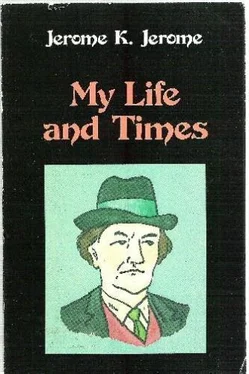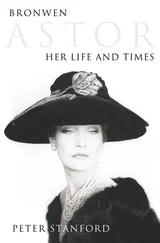So every volume of “My Memoirs,” every “Book of my Life” conforms to the strict convention. If, for the sake of a moment's variety, we hint at the possession of a vice, it resembles those of the Vicar of Wakefield, and “leans to virtue's side.”
The American publisher, whom we had playfully dubbed “Barabbas,” told us that Mark Twain had told him that he, Mark Twain, was writing a book of reminiscences, speaking quite frankly about everybody he had met. To avoid trouble all round, Twain was instructing his executors not to publish the book until twenty years after his death. Some time later, when I came to know Mark Twain, I asked him if it were true. “Quite true,” he answered; “I am going to speak of everybody I have met, exactly as I have found them, nothing extenuating.” He also added that he might, before he left London, be asking of me a loan, and hoped that, if he did, I should not turn out to be a mean-spirited skinflint. I still think the book was a myth, put about by Mark Twain for the purpose of keeping his friends nervous, and up to the mark. A sort of a book of the kind has, it is true, been published, since I wrote this chapter; but it isn't a bit the book he threatened. Anyhow, he never turned up for that loan.
The others drifted away, one by one. The old gentleman had retired to bed. Philip asked me to stop on awhile. I was living close by, in Tavistock Place. The site of the house is now occupied by the Passmore Edwards Institute. Passmore Edwards, who was then the proprietor and editor of The Echo , the first newspaper in London published at a halfpenny, had been a great friend of my father, back in the days when they were both young men. My father always claimed that it was he and Passmore Edwards who had introduced golf into the South of England. I do not press the point, not being sure of the view that may be taken of the matter on the Day of Judgment. Perhaps he was only boasting. They used to play it on the sands at Westward Ho. My father, at the time, was farming land the other side of the river, above Instow. Westward Ho was then a wild stretch of desolate sealand bounded on the north by the great pebble ridge. They used it as a bunker at low tide. It must have taken some getting over. I shared the ground floor of number nineteen Tavistock Place with a chum, George Wingrave by name. The rooms above us were occupied by two sisters. The elder was the mistress of a gentleman who is now a well-known member of Parliament, in addition to being a magistrate, inclined to deal severely with human faults and frailties. She committed suicide a day or two after he was married. I remember our quaint little old landlady, Mrs. Peedles—“Mrs. P.” George and I always called her for short—bursting in upon me with a white, scared face while I was writing. We found her unconscious, her sister kneeling by the sofa holding her in her arms; but she died before we could get help. Fortunately for our present well-known legislator, his father was a man of means and influence. “An overdose of morphia” was, I think, the verdict. It came out that she had been suffering from sleeplessness. She had been a quiet, reserved girl. The younger sister was religious.
So soon as we were alone, Philip re-introduced the subject of reminiscences. Asking me not to talk about it, he told me he had done the very thing we had decided to be impossible—had kept a diary, writing down the thoughts that came to him, his dreams and desires. Or, to speak more strictly, typing them. Since his blindness, he had become marvellously proficient on the typewriter. It was a curious mixture, this diary, according to his own account. One Philip was an evil thing, full of lusts and horrors, lower than any beast that crawled the earth. And another Philip was quite beautiful, and Christ would have loved him. And, in addition to these two, was yet a third Philip, who stood apart from both. Philip could not make out who this third one was. He seemed to be always just behind the other two, watching them both with passionless eyes. “There are times,” so Philip explained to me, “when he looks into my very soul and I shrivel up with shame; and there are rare moments when I feel as if he had entered into me and we were one.”
From another, I might have deemed this idle talk; but Philip was a curious fellow. Much tragedy had entered his life that must have gone to the making of him; and in him the animal and spiritual were both strongly developed. Behind that veil of darkness, there must have been many a grim struggle between them. Myself I always believed in the existence of that book about which we talked that night. I was abroad when he died. On my return I spoke about it to his father and he promised to make search for it.
But we never found it.
Chapter I
BIRTH AND PARENTAGE
I was born at Walsall in Staffordshire on the 2nd of May, 1859. My father, at the time, was the owner of coal mines on Cannock Chase. They were among the first pits sunk on Cannock Chase; and are still referred to locally as the Jerome pits. My mother, whose name was Marguerite, was Welsh. She was the elder daughter of a Mr. Jones, a solicitor of Swansea; and in those days of modest fortunes had been regarded as an heiress. It was chiefly with her money that the coal-pits had been started. My mother's family were Nonconformists, and my father came of Puritan stock. I have heard my mother tell how she and her sister, when they were girls, would often have to make their way to chapel of a Sunday morning through showers of stones and mud. It was not until the middle of the century that the persecution of the Nonconformists throughout the country districts may be said to have entirely ceased. My father was educated at Merchant Taylors School, and afterwards studied for an architect; but had always felt a “call,” as the saying is, to the ministry. Before his marriage, he had occupied his time chiefly in building chapels, and had preached in at least two of them. I think his first pulpit must have been at Marlborough. A silver salver in my possession bears the inscription: “Presented to the Reverend Clapp Jerome by the congregation of the Independent Chapel, Marlborough, June 1828.” And at that time he could not have been much over one and twenty. From Marlborough he went to Cirencester. There he built the Independent Chapel, and I see from a mighty Bible, presented to him by the “Ladies of the Congregation,” that it was opened under his ministry on June 6th, 1833. Altered out of all recognition, it is now the Cirencester Memorial Hospital on the road to the station. I have a picture of it as it appeared in my father's time. From an artistic point of view the world cannot be said to progress forwards.
On his marriage, my father settled down in Devonshire, where he farmed land at Appledore above Bideford; and also started a stone quarry. But the passion to be preaching never left him. In Devonshire, he preached whenever he got the chance, travelling about the country; but had no place of his own. When he gave up farming to go to Walsall, it was partly with the idea of making his fortune out of coal, and partly because a permanent pulpit had been offered him.
Sir Edward Holden of Walsall, a still vigorous old gentleman of over ninety, with whom I dined not long ago, tells me my father was quite a wonderful preacher, and drew large congregations to Walsall from all round the district. He preached at first in the small Independent Chapel that he found there. Later, the leading Nonconformists in the town got together, and the Congregational church in Bradford Street, which is still one of the features of the town, was built for him, my father giving his services as architect. It stands on the top of the hill, and in those days looked out over fields to Cannock Chase. It would be easy, as things turned out, for a wise man to point the obvious moral that if my father had followed sound Biblical advice—had stuck to his preaching, for which God had given him the gift, and had left worldly enterprise to those apter in the ways of Mammon, it would, from every point of view, have been the better for him. But if success instead of failure had resulted, then he would no doubt have been praised as the ideal parent, labouring for the future welfare of his children. It was the beginning of the coal boom in Staffordshire, and fortunes were being made all round him, even by quite good men. In my father's case, it was the old story of the man who had the money calling in to his aid the man who had the experience. By the time my father had sunk his last penny, he knew all that was worth knowing about coal mining; but then it was too late. The final catastrophe seems to have been hastened by an inundation; and to cut a long story short, my father, returning home late one evening after the rest of the household were asleep, sat himself down on the edge of my mother's bed and broke to her, as gently as possible, the not unexpected news that he was a ruined man. I see from my mother's diary that the date coincides with the first anniversary of my birthday.
Читать дальше










